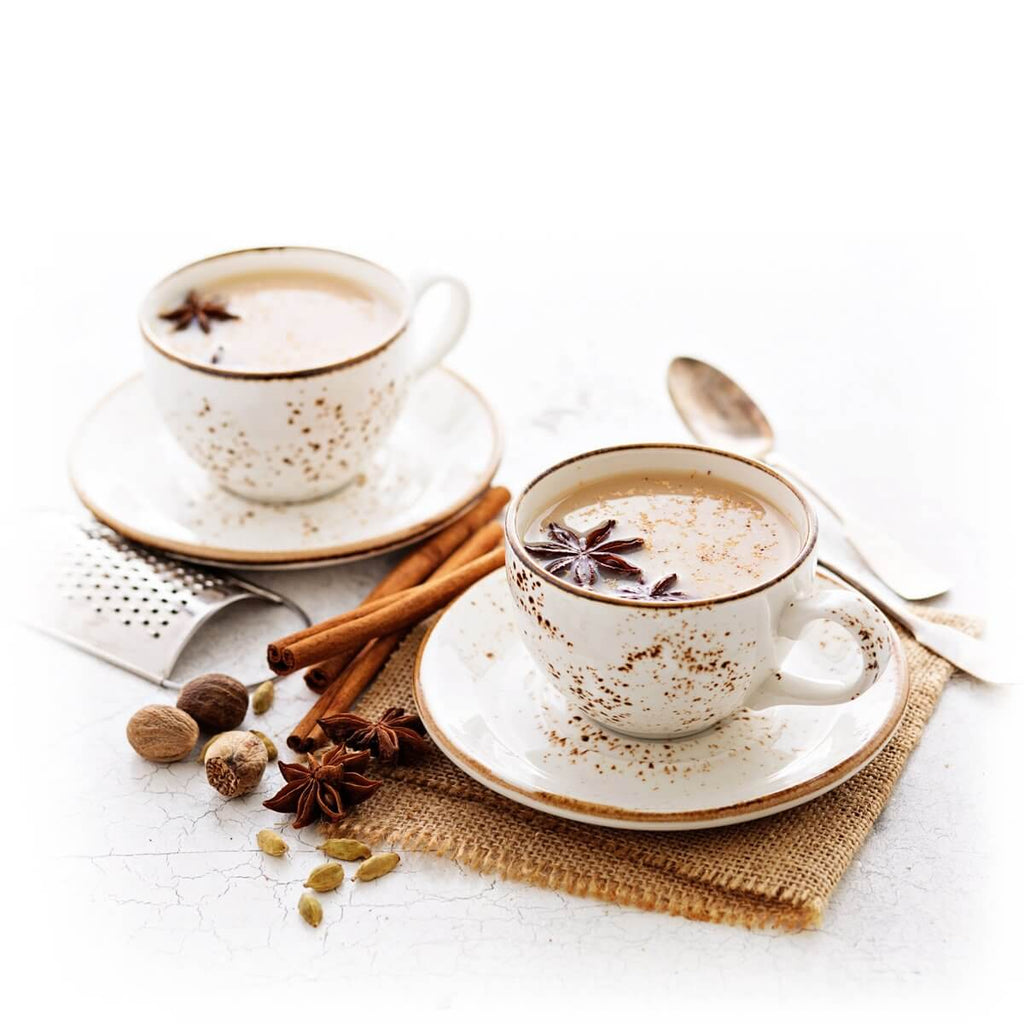Chai Tea Recipes and Frequently Asked Questions
Posted by JESSIE X

Chai tea, with its aromatic blend of spices and rich, comforting flavours, has gained immense popularity worldwide. Whether you're a chai aficionado or a newcomer to this delightful beverage, this blog post will guide you through a collection of chai tea recipes and answer some frequently asked questions about chai tea.
From classic masala chai tea to creative variations like chai tea lattes, we'll explore the world of chai tea recipes and help you make the perfect cup.
Chai Tea: A Flavorful Introduction
Chai tea is a beverage that originated in India and has been cherished for centuries. It is known for its bold and invigorating flavours, which are a result of a unique blend of spices and black tea leaves. The word "chai" simply means tea in Hindi, so when you say "chai tea," you are essentially saying "tea tea."
Chai Tea Ingredients
Before we dive into the recipes, let's take a look at some of the key ingredients that make up a classic chai tea:
- Black Tea: Chai tea starts with a strong, robust black tea base. You can use black tea bags or loose-leaf tea for brewing.
- Spices: The heart of chai lies in its spices. Commonly used spices include cinnamon sticks, cardamom pods, fennel seeds, and ginger. These spices are responsible for the warm, aromatic, and slightly spicy flavour of chai.
- Sweeteners: Traditional chai is sweetened with sugar or maple syrup, though you can adjust the sweetness to your preference.
- Milk: Milk adds creaminess and richness to chai. You can choose from options like whole milk, almond milk, coconut milk, oat milk, or soy milk depending on your dietary preferences.
Let's explore some delicious chai tea recipes, starting with the classic masala chai.
Classic Masala Chai Recipe
Masala chai is the quintessential Indian chai tea, loved for its bold spice profile and deep flavours. Here's how to make it:
Ingredients:
- 2 cups of water
- 2 black tea bags or 2 tablespoons of loose-leaf black tea
- 4-6 green cardamom pods, crushed
- 1 cinnamon stick
- 4-6 cloves
- 1-inch piece of fresh ginger, sliced
- 1-2 teaspoons of sugar or maple syrup (adjust to taste)
- 1 cup of milk (whole milk or your preferred milk substitute)
Instructions:
- In a saucepan, bring the water to a boil.
- Add the tea bags, loose-leaf tea, and all the spices (cardamom pods, cinnamon sticks, cloves, and ginger).
- Simmer for 5-7 minutes on low heat, allowing the spices to infuse.
- Add sugar or maple syrup and stir until dissolved.
- Pour in the milk and simmer for another 2-3 minutes.
- Strain the chai into cups or mugs, and it's ready to serve!
Chai Tea Latte Recipe
If you prefer a creamier chai experience, the chai tea latte is your go-to choice. It's a delightful blend of spiced tea and frothy milk.
Ingredients:
- 1 cup of water
- 2 black tea bags or 2 tablespoons of loose-leaf black tea
- 4-6 green cardamom pods, crushed
- 1 cinnamon stick
- 4-6 cloves
- 1-inch piece of fresh ginger, sliced
- 1-2 teaspoons of sugar or maple syrup (adjust to taste)
- 1 cup of milk (whole milk or your preferred milk substitute)
Instructions:
- Boil water in a saucepan, then add the tea bags or loose-leaf tea and all the spices (cardamom pods, cinnamon stick, cloves, and ginger).
- Simmer for 5-7 minutes, allowing the spices to infuse.
- Add sugar or maple syrup and stir until dissolved.
- Pour in the milk and continue to simmer for another 2-3 minutes.
- Using a milk frother or blender, froth the mixture until it's creamy and foamy.
- Strain the chai latte into your favourite mug and enjoy!
Chai Tea Variations
Chai tea is incredibly versatile, and you can get creative with your recipes. Here are some popular variations to try:
- Coconut Chai
Swap out regular milk for coconut milk to give your chai a tropical twist. The creamy coconut flavour complements the spices beautifully.
- Oatmeal Chai
Add a dash of oat milk to your chai for a subtle nutty flavour and a touch of creaminess.
- Darjeeling Chai
Use Darjeeling tea instead of regular black tea for a lighter and more delicate chai experience.
- Homemade Chai Masala Powder
Create chai masala powder by grinding spices like cardamom, cinnamon, and cloves. This allows you to tailor the spice blend to your liking.
- Maple Chai
Replace sugar with pure maple syrup for a unique sweetness that complements the spices.
Frequently Asked Questions About Chai Tea
Now that we've explored some delicious chai tea recipes let's address some common questions and misconceptions about chai tea.
Are Chai Tea Lattes Good for You?
Chai tea lattes can be a part of a healthy diet when consumed in moderation. They offer the benefits of black tea and the potential health benefits of spices like cardamom and ginger. However, be mindful of added sugars and high-calorie milk substitutes, as they can contribute to excess calories.
Is Chai Tea Good for a Sore Throat?
Chai tea, especially when made with ginger, can be soothing for a sore throat. Ginger has anti-inflammatory properties and may provide relief from throat discomfort. However, avoid excessive heat in your chai, as hot beverages can sometimes worsen throat irritation.
Can Chai Tea Cause Diarrhea or Constipation?
Chai tea itself is unlikely to cause diarrhoea or constipation. However, if you have a sensitive stomach, the spices in chai can sometimes be a trigger. Adjusting the spice levels and consuming chai in moderation may help avoid digestive discomfort.
Can Chai Tea Make You Poop?
Chai tea's spices, particularly ginger and black pepper, have digestive properties that may promote bowel movements in some individuals. If you find that chai has a laxative effect on you, it's essential to consume it in moderation.
Can Chai Tea Help You Sleep?
Chai tea contains caffeine from black tea, which can interfere with sleep if consumed in the evening. If you're looking for a bedtime beverage, consider caffeine-free herbal teas.
Can Chai Tea Cause Acid Reflux or Heartburn?
Chai tea can sometimes exacerbate acid reflux or heartburn symptoms, mainly due to its caffeine content and the presence of spices. If you're prone to acid reflux, it's best to choose a caffeine-free herbal tea.
Can Chai Tea Help a Sore Throat?
As mentioned earlier, chai tea with ginger may provide relief for a sore throat due to ginger's anti-inflammatory properties. However, it's not a substitute for medical treatment if the sore throat is severe or persistent.
Can Chai Tea Upset Your Stomach?
Chai tea can potentially upset sensitive stomachs, primarily because of its spices. To avoid stomach discomfort, start with a milder version of chai and gradually increase the spice levels as your tolerance develops.
Can Chai Tea Help You Lose Weight?
Chai tea alone is not a weight loss solution, but it can be a flavorful alternative to sugary beverages. If you enjoy chai tea, choose lower-calorie milk substitutes and avoid excessive sweeteners to support a weight-conscious diet.
Can Chai Tea Cause Kidney Stones?
Chai tea, when consumed in moderation, is unlikely to cause kidney stones. However, if you are prone to kidney stones, it's essential to maintain good hydration and consult with a healthcare professional regarding your diet.
How Is Chai Tea Made?
Chai tea is made by simmering black tea leaves or tea bags with a blend of spices, sweeteners, and milk. The specific ingredients and preparation method can vary widely, allowing for various flavour profiles and regional variations.
What Chai Tea Does Starbucks Use?
Starbucks typically uses a concentrate called "Tazo Chai Tea Concentrate" to make their chai tea lattes. This concentrate contains black tea, sweeteners, and a blend of spices. You can replicate a similar taste at home using your preferred black tea and chai spice blend.
In Conclusion
Chai tea is a delightful and versatile beverage with a rich history and a world of flavours to explore. Whether you prefer the classic masala chai or want to experiment with creative variations, chai tea offers a warm and comforting experience. Remember to enjoy it in moderation, adjust ingredients to your taste, and embrace the soothing blend of spices that chai brings to your cup.
SHARE:

AUSTRALIA'S FINEST LOOSE LEAF TEAS
Explore Australia's largest selection of Premium Teas & All-Natural Organic Herbal Blends.


